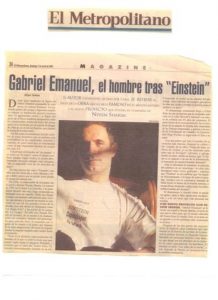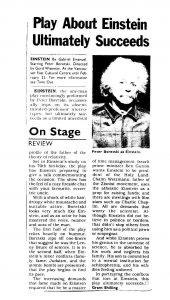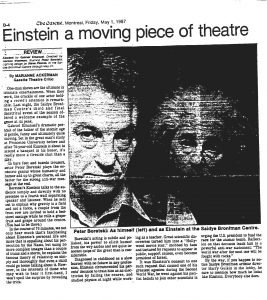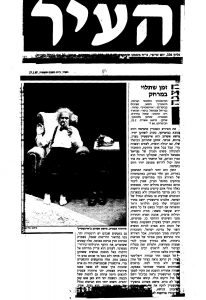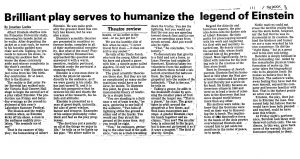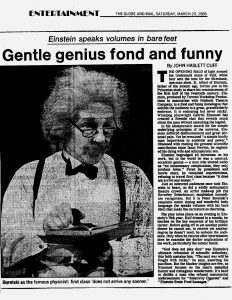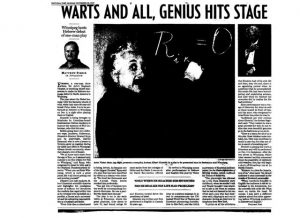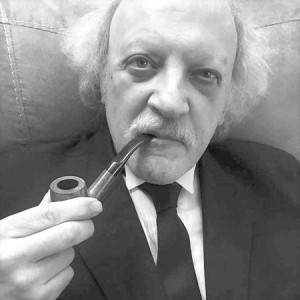Most folks know of Albert Einstein — even after his death more than 50 years ago. He’s a household name because of his keen scientific mind, said Fran Jansta.
But many may not know the struggles he went through as a Jew during Nazi Germany, as well as his philosophy of peace, Jansta said.
Those who come to see Jansta, of Antioch, portray Einstein in a one-man play at PM&L Theatre June 9-10, will learn more about the originator of the theory of relativity, both as a man and a scientist.
“Einstein: A Play In Two Acts,” written by Gabriel Emanuel, depicts Einstein as a 70-year-old sharing experiences from his early childhood to his scientific discoveries and his struggles with the issue of peace amid the nuclear age.
Jansta is a veteran PM&L actor and director who was awarded best lead actor for his portrayal of Fagin in last season’s “Oliver!”
Jansta said when he retired last year that he wanted to take the scary plunge into a one-man play. His wife, Trish Jansta, who retired a year earlier, portrayed Shirley Valentine in a one-woman play last year.
The one-person shows are produced by Mother Road Productions, owned by John Haderlein of Libertyville. Haderlein, an actor while not working as an attorney, said he’s wanted to produce such plays for a while.
“I tapped one of my friends to do our first show, called ‘Barrymore’s Ghost,’ and then I finally got the courage to do Clarence Darrow,” at Three Brothers Theatre,” he said.
“It’s not about the sets or the costumes. It’s about the writing and the acting. When you get one person up there for two acts, pouring their heart out, it becomes about the strength of the acting and the writing. I’m very fascinated with that,” he said.
Jansta, who loves science, approached Haderlein about doing the Einstein play more than a year ago. Jansta underwent bypass surgery while rehearsing, recuperated and then returned to finish rehearsing and get the play scheduled at PM&L.
Both men have learned a great deal about the struggles Einstein endured through his life.
“What I didn’t know was that Einstein was a real peace maniac at a time when the whole nuclear bomb issue was coming forward,” Haderlein said.
Einstein was known for promoting the Manhattan Project, developing a nuclear bomb, and yet he didn’t believe in war, said Haderlein.
As a Jew, Einstein fled Nazi Germany, Haderlein said, and then he began to embrace his Jewish heritage.
“One of the things that’s most interesting about Einstein is when he was a small child, the family thought he might be mentally challenged because he didn’t speak until he was at least 9 or 10 years old,” Jansta said. “That comes up in the play. He would visualize things mentally and observe the world and do exercises in his mind.”
To prepare for the play, Jansta watched old black-and-white videos of Einstein from documentary films.
“You see there’s a twinkle in his eye,” Jansta said. “There’s an accessibility, even with the theories that aren’t really easy to understand. He tries to simplify them as best as he can.”
Jansta said that in the play, Einstein “speaks about not being very religious when he was growing up, but then being forced to make changes in his life because he was Jewish and then coming to grips with his Jewish heritage.”
The play also delves into Einstein’s self-labeling of being a pacifist while he supported creating the atomic bomb. “That haunts him through the whole play,” Jansta said, adding thathe hopes the play enlightens the audience and inspires them to learn more about Einstein.
“This play couldn’t be more relative than it is now,” Haderlein said.
Sheryl DeVore is a freelance writer for the News-Sun.


